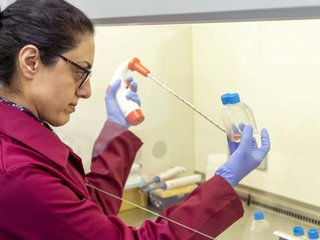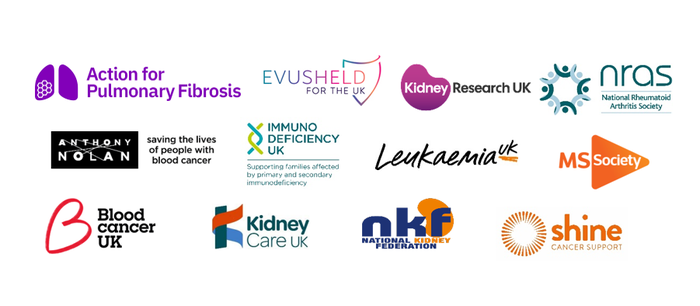Our letter to the UK Health Security Agency representing immunocompromised people
With a coalition of 11 other charities and organisations representing immunocompromised people, we've written to UK Health Security Agency chief, Dame Jenny Harries, to ask about the pause and review of the ONS Covid-19 Infection Survey and urged her to reconsider. Here is the letter in full:
Dear Dame Jenny Harries,
We are writing to you as a coalition of charities representing immunocompromised people regarding the UK Health Security Agency’s decision to pause the Office for National Statistics (ONS) Coronavirus (COVID-19) Infection Survey (CIS).
Last month, UKHSA announced an indefinite pause to the survey while it reviewed its approach to COVID-19 surveillance going forward. As the pause came into effect, further announcements were made drastically reducing symptomatic testing in England and Wales and detailing the upcoming closure of the NHS COVID-19 app.
The statement announcing the pausing of the ONS CIS describes it as an effort to ‘ensure our surveillance activities remain proportionate and cost effective with the move to Living with COVID-19.’ However, in the Government guidance for Living with COVID-19, it states that ‘UKHSA will maintain scaled down critical surveillance capabilities including the COVID-19 Infection Survey (CIS) population level survey, genomic sequencing and additional data.’
Many immunocompromised people do not receive the same level of, if any, protection from vaccinations and so continue to be at high risk from COVID-19. Whether they are transplant recipients or living with long-term medical conditions such as cancer, these individuals continue to need information and support to protect them from developing severe COVID-19 and to help them make informed choices about behavioural precautions they follow.
In current Government guidance, people with weakened immune systems are advised to ‘try to avoid contact with people who have symptoms of COVID-19’.
We have heard from many vulnerable people we support that having knowledge of the scale of COVID-19 infections across the UK and in their local area empowers people with weakened immune systems to better understand their personal level of risk and make an informed decision. Without this knowledge, immunocompromised individuals’ confidence in mixing with others and re-starting activities, including returning to the workplace, will be undermined. There is also a mental health impact for patients with such uncertainty about their safety.
Without the data from the ONS CIS, or an appropriate alternative, immunocompromised people are not only being left behind with the Living with COVID-19 plan, but they are being left in the dark.
Kidney transplant recipient, via Kidney Care UK:
"I’m post transplant and I have been relying on the ONS survey to make choices about what I do (which isn’t much even when the figures are at their lowest). Finding that the publication of ONS figures has been culled has made it worse. I don’t know what to do - I already spend most of my time indoors.’
Immunodeficiency UK patient representative:
"As I am immunocompromised and vulnerable to serious COVID disease, I really appreciated the ONS study to inform me of level of local community COVID infection on weekly basis. I was able (with caution) to do more with family and friends when levels were lower. It was great. Without this information I feel I am struggling to make informed decision of level of COVID infection and as a result I am now doing less mixing and feeling more anxious"
We are also concerned that with reduced testing and available data, without the CIS, it will be harder to identify and predict the incidence of future COVID-19 variants of concern. This risks the ability to reintroduce key protective measures, such as mass vaccination and testing, in an emergency, and may potentially delay or prevent the provision of effective antiviral, therapeutic and pre-exposure prophylactic treatments to those at high risk of severe COVID-19.
We would be grateful if you could share with us the following information as a matter of urgency:
- What is the timeline for the UKHSA review of COVID-19 surveillance? When will a final decision be made?
- What alternative surveillance is being considered? Is resuming the CIS an option?
- Will people with weakened immune systems or organisations representing these groups be invited to provide input?
- Once the current review is complete, in what scenarios will UKHSA consider an urgent review of COVID-19 surveillance?
We look forward to hearing from you and would be very happy to meet to discuss further.
Yours sincerely,
Louise Wright
Chief Executive, Action for Pulmonary Fibrosis
Henny Braund MBE
Chief Executive, Anthony Nolan
Helen Rowntree
Chief Executive, Blood Cancer UK
Mark Oakley, Nikola Brigden & Prof. Martin Eve
Evusheld for the UK
Dr Susan Walsh
Chief Executive, Immunodeficiency UK
Paul Bristow
Chief Executive, Kidney Care UK
Sandra Currie
Chief Executive, Kidney Research UK
Fiona Hazell
Chief Executive, Leukaemia UK
Andrea Brown
Chief Executive, National Kidney Federation
Clare Jacklin
Chief Executive, National Rheumatoid Arthritis Society (NRAS)
Nick Moberly
Chief Executive, MS Society
Ceinwen Giles
Co-Chief Executive, Shine Cancer Support

Because we've been beating blood cancer since 1960
We’re a community determined to beat blood cancer. We do this by funding research that takes us closer to a cure.

